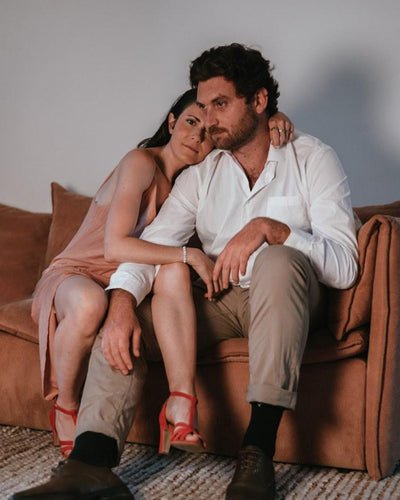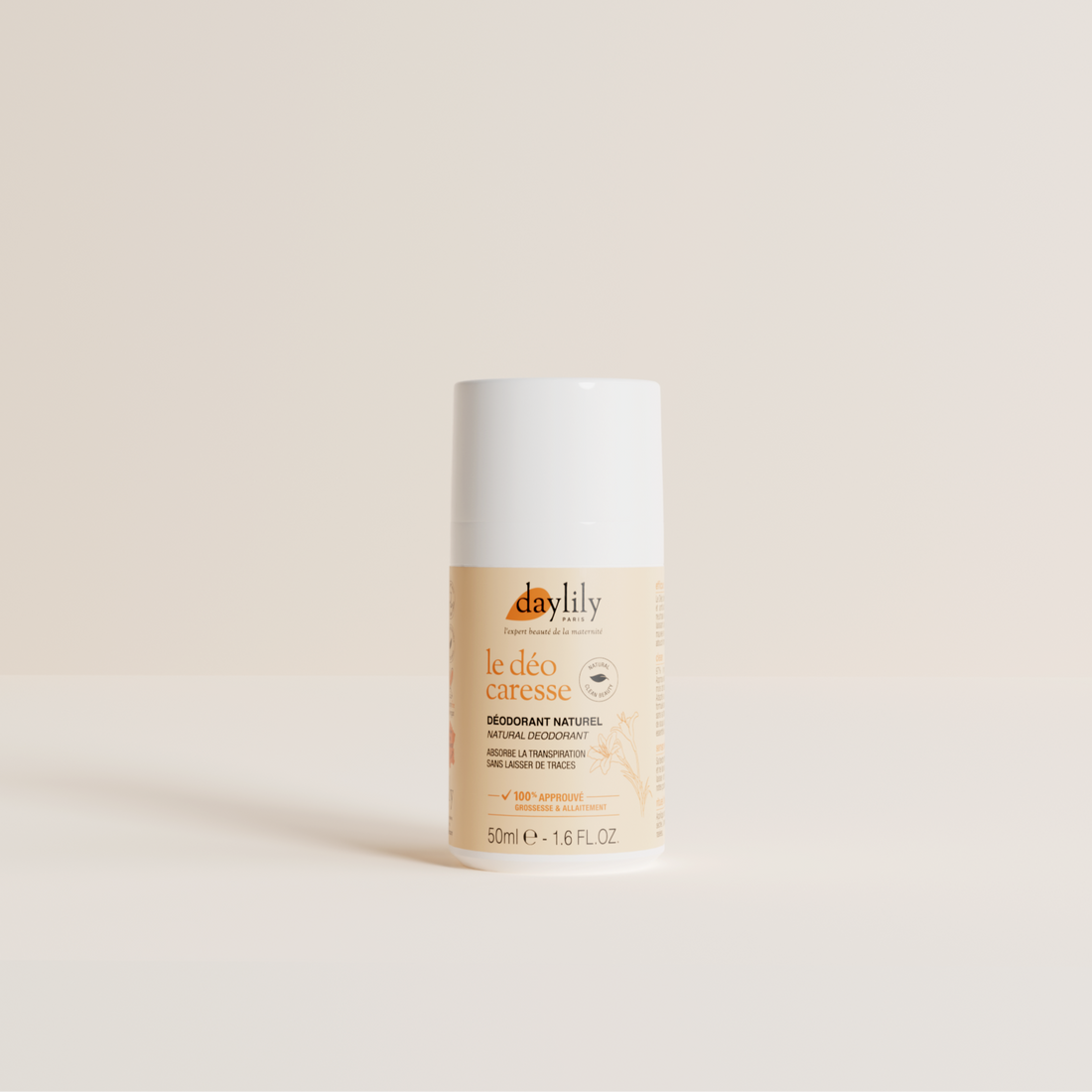- What was your journey before the birth of your daughter Victoire?
- Anaïs, how did you experience this journey from a psychological point of view?
- Clément, what was happening on your side?
- What was the hardest thing for you to experience?
- Would you say that PMA has had an impact on your relationship?
- What have you put in place to deal with it?
- What would you advise to couples facing infertility, to prevent their journey from having too much impact on their relationship?
What was your journey before the birth of your daughter Victoire?
Anaïs : With more distance today I can say that we were lucky in our journey.
After confinement, when we returned to Paris, we made an appointment with a gynecologist. Seeing my health journey, she put us directly on medical help to have a baby, telling me about what she calls “the golden ticket” to getting pregnant. Three cycles of failure, cysts, cyst perforations follow. No positive test on the horizon, but above all no sign of ovulation despite the treatments…
At that time we moved to Nantes and I therefore changed doctors. We try a new treatment for two cycles and it's still a failure. This doctor then decides to put everything on hold : I have a cyst the size of a tennis ball which has displaced the ovary in front of the uterus...
Meanwhile, Clement is also doing tests to make sure he too doesn't have signs of infertility - but all is well.
For my part, I'm having a hard time with this break after a surge of hope. And then I look for how to help my body respond better to treatments. I discovered the power of seed cycling and cycle sync (Editor's note: if these concepts interest you, Anaïs produces a lot of content around these subjects on her Instagram account ). I am following a program to restart my hormonal function in order to optimize it in preparation for resuming treatments. After a two-month break, stimulation is resumed with a more aggressive treatment. A single cycle was enough to make the magic happen.
Anaïs, how did you experience this journey from a psychological point of view?
I talk about it a lot in the book I co-wrote with @healthylifemary, “Moms above all” where we discuss our journeys to becoming a mother: how it happened, why it happened and how we experienced it afterwards too.
This journey for me was very complicated on a psychological level. After all, whether or not we decide to have children, which is an individual choice specific to each person, women are physiologically made to give birth. And when we find ourselves in menopause at 25, with uterine tumors, we are angry, in enormous confusion in the face of a body which physiologically does not react. And then we meet the love of our life at 31 and we have to explain to him and lay our cards on the table by saying that we have little chance of being parents . We have the impression of carrying the weight of the couple's infertility and we say to ourselves: “I am not even capable of doing what nature predestined me to do. » We lose all spontaneity in the couple. We are told when to make love and when not to. We take our temperature and at the slightest spike, whatever our desire that day, we jump on our partner. We are told that this or that position is more favorable than others. Around us, couples who have been trying for 15 days announce that they are expecting a baby. For our part, we are always canceling our vacations because we have to live to the rhythm of the ultrasounds which determine our sex life. Our spouse becomes our nurse, and must, just after having bitten us, become our lover... It's not easy. Even though I talked about it with a few people close to me and was lucky enough to have my best friend who was going through a similar story, I felt alone. We feel terribly empty inside. As if everything was on pause. Anger and sadness punctuated months of waiting.
Clément, what was happening on your side?
First of all, it must be considered that I was quickly informed by Anaïs of the difficulties she might have in conceiving a child. So I was at least lucky to have this honesty, which allowed a certain mental preparation, to both anticipate the timing (time was against us) and the possibility of a journey strewn with pitfalls.
What was most difficult to accept and digest was all the time wasted before meeting the right gynecologist and making the decision to enter a PMA course. Anaïs has tried a lot of things to be able to find even one cycle and it is very complicated to have this position of partner who does her best to bring optimism and comfort , failure after failure, without have a real influence on the success of the other's efforts.
What was the hardest thing for you to experience?
Clément : Once the right professional has been found and the real journey has been launched, what is most disturbing and unpleasant is the non-spontaneity of things . Entering a PMA course means agreeing to rationalize and plan what you are programmed to do in a natural way, with its element of randomness. We lose part of the magic of getting pregnant by removing the fact that it can happen without really preparing for it.
This being said, the PMA course is not an implacable mechanism either and there remains this random element demonstrating that the body remains the final decider of the success or otherwise of procreation . So, we hope, we cross our fingers, and at the same time we seek to protect ourselves from further disappointment. This paradox gives a certain tension, but this tension increases the joy when we discover that the PMA worked.
Would you say that PMA has had an impact on your relationship?
Anaïs : As we said, there is no longer room for spontaneity. There is no more room for magic. Everything is calculated and it is not simple. In our book, I tell an anecdote which clearly shows the level of tension and despair: I was supposed to go to Paris, but the doctor had just called to tell me that I was ovulating. We were supposed to make love on Monday, not Tuesday, then on Wednesday. Stitching before each time. On Wednesday, I had my train at 8:45 a.m. I woke up Clément who was sleeping by shaking him, telling him that we absolutely had to make love before I left. He told me he was too tired. I got on top of him and said, “Don’t worry, I’ll take care of everything.” » And for a moment he stops, saying that he is sorry, that he is half asleep and that he cannot emerge. I left in tears, I was inconsolable, telling him that if it was another cycle of injections for nothing it was entirely his fault. It turns out that Monday was enough and I became pregnant with Victoire. But that's to say the threshold of despair... All these months of forcing yourself, of losing complicity, of calculating, of having resentment.
Clément : Yes of course, it would surprise me to meet people for whom PMA has not had an impact. This is a medical support protocol to rationalize a “natural” process, therefore random and intuitive. For us, it was depriving ourselves of a form of mystery and magic, we could not stay on the principle of “We love each other, it will happen one day”. So in concrete terms, it's no longer considering pregnancy as an event, but an objective , which means action plan, calendar, means... Not really what we want to experience in a love story.
What have you put in place to deal with it?
Anaïs : In the “low” periods before ovulation or before periods, we went out a lot. We were trying to talk about something else! Clément also helped me plan ahead by looking for ideas for baby names. We communicated a lot, that was really the basis for holding on. We told each other how we were doing. But in the end we did n't have a magic wand and it was complicated. I had depression. I was alone this last Christmas before it worked in January. I was lucky to have a patient, attentive and positive husband, as well as some very caring friends, but unfortunately I don't have any great stories to tell about cool things done, like reserving a hotel room.
Clément : To deal with it, I think we tried to dialogue as much as possible. Supporting and encouraging each other is essential. For the rest, take your mind off things, get some fresh air and do things like a couple and not two procreators : continue to seduce each other, to have sex even when it's not the right time, go to a restaurant, go on a mop…
What would you advise to couples facing infertility, to prevent their journey from having too much impact on their relationship?
Anaïs : I would advise communicating. Really put into words. No taboo !
Clément : For my part, I would advise remaining a couple , not falling into the paradigm: “We are two parents looking for a pregnancy”. You were two people who loved each other before the PMA journey, you must remain so and you should remain so after. No matter what happens, the winding path to having a child is only possible if two people love and continue to cherish each other.














